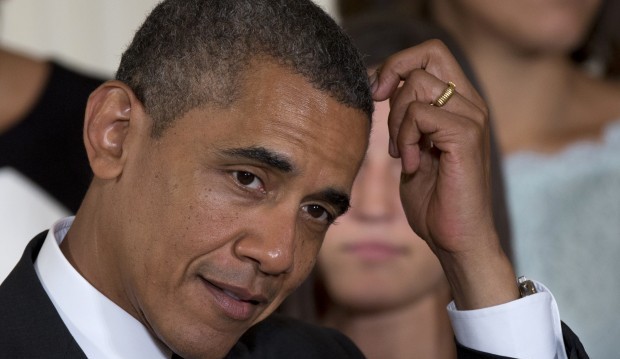The worst thing that could happen is for the Syrian crisis to be transformed into a US domestic politics issue. This is what happened in the case of Iraq which continues to arouse passions along the Potomac. The US spent a good deal of blood and wealth, as Americans keep reminding everyone, but ended up with nothing in terms of tangible gains.
Iraq became a code word for many things, except Iraq itself.
We now face the danger that Syria, too, may become a code word for other things that have little or nothing to do with the Syrian tragedy.
Let’s start with Barack Obama.
The US president is still fighting his presidential campaign of 2008. He is still trying to prove that he is no George W. Bush. A day after he announced he was going to bomb Syria he came out to say that he wouldn’t take such a move without going to the US Congress.
As a constitutional lawyer, Obama knows that the US system of government is based on the separation of powers. This means that though the legislature branch—Congress—should be consulted, the executive—the president—has the power to use force in defence of national imperatives.
That is what many American presidents have done at different times and under different circumstances.
President Thomas Jefferson dispatched a task force to crush the pirates of North Africa that raided American ships in the Mediterranean. James Polk used force to expand the territory of the union against native tribes and Hispanic neighbors. Theodore Roosevelt had no qualms about using force without clearing it with Congress. In more recent times, Harry Truman ordered intervention in Korea on his own authority. John F Kennedy did the same by taking the US into Vietnam and triggering a nuclear stand-off with the Soviet Union over Cuba. Gerald Ford had his modest bout of sabre-rattling with the Mayaguez incident. Ronald Reagan used presidential powers to send the Marines into Lebanon and to invade Grenada. He also ordered bombing raids against Libya. Bill Clinton asked no authorization when he launched missiles against Sudan and Afghanistan and, later, ordered intervention in Bosnia and Kosovo.
The War Powers Act stipulates that the president does not have the authority to order a military attack in a situation that does not involve actual or imminent threats to the nation. The crucial point, however, is that it is the president who decides whether or not there is such a threat.
Last week, when Obama announced that he was taking action the initial assumption was that he had made the necessary judgment. When he dropped the bombshell about consulting Congress he admitted that he had not.
Obama may be a victim of his own passion for speech-making. Often, he has nothing to say but says this beautifully. Two years ago, he said that Syrian President Bashar Al-Assad “must go.” No one forced Obama to make so emphatic a declaration. But it was clear that he enjoyed saying it.
It sounded so good!
Obama did the same thing a year later when he declared that the use of chemical weapons by Assad was a “red line” that, if crossed, would have “consequences.” No one forced him to say this, but, again, he seemed to enjoy saying it.
However, what is done is done. And whether one likes it or not, the US will be led by Obama for another 38 months.
The president’s opponents should not use Syria as a means of settling scores. The temptation to defeat Obama in Congress over Syria may be too great for both the right-wing of the Republican Party who regard him as a crypto-Communist “foreigner” and the left-wing of the Democrat Party who believe he has sold out to “capitalist warmongers.”
Outside America, some are using Syria as a means of settling scores with the United States. The other day in London I chatted with some of the 50 or so “anti-war demonstrators” taking the sun in Trafalgar Square.
“Why are you here today?” I asked.
“To oppose American war plans,” came the standard answer.
Among those protesting were two or three older figures carrying a banner in Persian that read: “Iranian Workers’ Communist Party”. When I asked whether they had also demonstrated against Russia when it invaded Georgia in August 2008, they answered that they were not aware of that event.
In other words, what mattered was to vent hatred against the US and not to help stop the massacres in Syria.
It is important to return the Syrian issue to its proper context. What is happening in Syria is a human tragedy that should concern all mankind. This is not an American problem, nor is it a means of proving Obama’s narcissism or incompetence.
The most legalistic pedants would have little difficulty finding the laws needed for intervention. The ideal formula would be action by the United Nations, with the Security Council assuming leadership. However, that cannot happen because Vladimir Putin is more interested in thumbing his nose at the US than protecting Syrians.
However, action is possible outside the Security Council. Chemical weapons are banned under international treaties dating back to 1925—with even Russia and Iran as signatories. The use of such weapons is a war crime, defined under international law, and must not go unpunished.
Then there is the “international community consensus” reached at the 2005 World Summit about the responsibility to protect people against massacre and genocide.
What we do about Syria should not be decided on the basis of whether it is good or bad for Obama. We should not urge intervention because if the US sits back it will witness the end of “American leadership.” Even if Obama does nothing, American power will remain a reality on the ground. US prestige recovered from other Obama-like presidents, most notably Jimmy Carter.
Intervention in Syria ought to be decided on its own merits. Any decision based on hidden agendas—domestic or foreign—will be ineffective at best and disastrous at worst.
